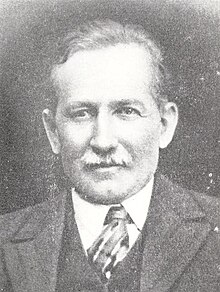| This article includes a list of general references, but it lacks sufficient corresponding inline citations. Please help to improve this article by introducing more precise citations. (December 2023) (Learn how and when to remove this message) |
| Naum Elias Yaqub Palakh ܢܥܘܡ ܐܠܝܐܣ ܝܥܩܘܒ ܦܐܠܐܟ | |
|---|---|
 Faiq, c. 1920s Faiq, c. 1920s | |
| Born | February 1868 (1868) Diyâr-ı Bekr, Ottoman Empire (now Diyarbakır, Turkey) |
| Died | February 5, 1930(1930-02-05) (aged 62–63) New Jersey, United States |
| Occupation(s) | poet, journalist, teacher |
| Movement | Assyrian nationalism |
Naum Elias Yaqub Palakh (February 1868 – February 5, 1930), better known as Naum Faiq (Syriac: ܢܥܘܡ ܦܐܝܩ, Naˁum Fayëq), was an Assyrian poet, journalist, and teacher, remembered as one of the founding fathers of modern Assyrian nationalism during the early 20th century. He was a teacher and writer throughout his life. As a Syriac Orthodox Christian, he emphasized the importance of unity among Syriac Christians and encouraged his community to depart from "tribal mentality".
Early life
He was born in Diyâr-ı Bekr (present-day Diyarbakır) in the Ottoman Empire and began his education there at the age of seven. After primary school, he attended the local high school that had been established by local "Brotherhood of Ancient Syrians". He spent 8 years at the school, where education was jointly in classical Syriac, Ottoman Turkish and Arabic. Naum also went on to learn several other languages, including Persian and basic French. After his parents died, he first lived with his older brother Thomas and then started teaching in a village near Diyarbakır in 1888. He also taught in Urfa, Adıyaman and Homs before returning to Diyarbakır.
Literary works
Naum wrote numerous books concerning the Syriac language and people. After the 1908 Young Turk Revolution and the proclamation of the second Ottoman constitution, restrictions on freedom of speech were lifted. In 1910, Naum began publishing a newspaper for the Orthodox, Catholic and Protestant Syriac communities, entitled Kawkab Madnho ("Star of the East"). While written entirely in the Syriac alphabet, Star of the East was actually tri-lingual with articles in Ottoman Turkish, classical Syriac and Arabic. This newspaper, along with that of Ashur Yousif, signaled the emergence of Assyrian nationalism in the Syriac Christian communities of the Ottoman Empire.
After the Ottoman Empire and Italy began to fight over the province of Libya in 1911, Naum like other Christians in the region felt a backlash from the Muslim community and in 1912, he fled to United States, where he began to write for the newspaper Intibah ܐܢܬܒܗ (Cirutho ܥܝܪܘܬܐ, in English: Awakening), published by Gabriel Boyaji from 1909-1915. He went on to establish various Assyrian newspapers including Beth-Nahrin in 1916 and became the head of the editorialship of Huyodo, a magazine that is still published today under the same name in by the Assyrian Federation in Sweden.
Death
The death of his wife in 1927 affected Naum very much. He died in New Jersey in 1930 due to lung disease. "Naum Faiq" day is celebrated yearly on February 5. Ceremonies are usually held in Syria, United States, and in various European nations.
Poems
Awake, son of Assyria
His most famous poem is titled "Awake, son of Assyria, awake!" (ܐܬܬܥܝܪ ܒܪ ܐܬܘܪ ܐܬܬܥܝܪ).
:Awake, son of Assyria,
- Awake and see the world how enlightened.
- The chance is fleeing from us
- And time is running out
- Awake son of Assyria, Awake!
- In vengeance you will take refuge.
- Rise up and band together to strengthen.
- And if one does not awake we have lost our chance
- Without a purpose, misfortune will befall our land.— Naum Faiq
Homeland
:Did our hearts become of stone
- Did our hearts become of iron
- Or did our eyes become blind
- Let our red blood flow
- Let our silent hearts whine
- Let the Assyrian youth always say
- Oh, are there still any catastrophes which we haven't gone through yet
- From the moment that we came to this world
- From the womb till our grave we cannot keep our homeland out of our minds
- The only thing I desire from the Lord
- Is that He will not take away my soul until I have seen you...homeland.— Naum Faiq
See also
References
- "A Brief Study in the Palak Nationalism", by Dr. David Barsoum Perley LL.B.
- In memory of Malfouno Naoum Fayiq, the master of the national unity, by Aprim Shapera.
- Yonan, Gabrielle (1985), Journalismus bei den Assyrern
- "Neo-Assyrianism & the End of the Confounded Identity". Zinda. 2006-07-06. Archived from the original on 2007-12-01.
The fact remains that throughout the last seven years and the last 150 years for that matter the name Assyrian has always been attached to our political ambitions in the Middle East. Any time, any one of us from any of our church and tribal groups targets a political goal we present our case as Assyrians, Chaldean-Assyrians, or Syriac-Assyrians – making a connection to our "Assyrian" heritage. This is because our politics have always been Assyrian. Men like Naum Faiq and David Perley emerging from a "Syriac" or "Jacobite" background understood this as well as our Chaldean heroes, General Agha Petros d-Baz and the late Chaldean Patriarch Mar Raphael BiDawid.
- "Ado Faiq". ado-world.org. Archived from the original on 19 April 2009. Retrieved 8 December 2022.
- "Archived copy". Archived from the original on 2011-07-18. Retrieved 2009-04-05.
{{cite web}}: CS1 maint: archived copy as title (link) - "TurkoAssyrian". Archived from the original on 2007-10-29. Retrieved 2007-11-04.
- ^ Naum Faiq (2005). "Seyfo Commemoration and Demonstration in Brussels". Zinda Magazine. Archived from the original on 2013-01-11.
- Chuqqî, Murâd Fu'âd (1936). Na'ûm Fâ'iq. Dhikrâ wa-takhlîd al-adîb al-suryânî al-kabîr.